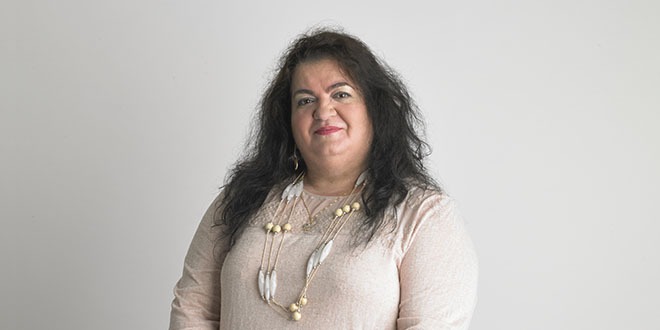Canadians with type 2 diabetes write back to their younger selves, to share personal insights and reflect on their experience of living with diabetes and starting on insulin therapy. In this post, Fatima reflects on living with diabetes.
Fatima grew up in Brazil and from a young age enjoyed being in the kitchen, cooking and baking. That love of domestic arts grew to include sewing, embroidery and gardening as she entered adulthood and became a teacher.
Her father died at the age of 43, which led to the relocation of the entire family. Fatima emigrated to Canada when she was 23, and eventually everyone else joined her.
Fatima married and all was well until she lost a baby when she was 28. A year later, she got pregnant again and was diagnosed with gestational diabetes. Although she was told that the condition would disappear after she had her baby, it did not. Fatima was filled with despair.
“I blamed myself for the first year after I was diagnosed,” she remembers. “I didn’t talk to anybody. I wouldn’t answer the phone. My husband would go to work and I would sew all day long.” Her life was empty.
This year of self-imposed isolation and intense guilt ended when her vision became blurry and her body began to hurt. Her doctor referred Fatima to an endocrinologist, who in turn recommended that she attend a week-long seminar on diabetes. For eight hours a day, Fatima was submerged in information about diet, exercise, medication and the effects of diabetes on the body. At the seminar she also learned how to use insulin.
It was a huge turning point. “The more I learned, the more I started to better manage my diabetes on a day-to-day basis,” she says.
Now 59 years old, Fatima is writing to herself at 29, during her lonely year after being diagnosed.
Dear Fatima,
You are spending all day, every day, scolding yourself. You’re overweight. You should stop cooking and baking so much. You don’t deserve to be here. You don’t deserve anything.
But, Fatima, heaping blame on yourself won’t change anything—and it certainly won’t make your condition better. Here’s what will: opening your mind. You will have the chance to attend a seminar that will help. You’ll look around at the other “students,” who will be people your age, but also older people, babies and children, too. You will realize: Diabetes can happen to anyone.
After soaking up all the information in the seminar you will start going to the library to understand your condition even better. Being diabetic will teach you how to eat healthy food and to exercise more. Insulin will help to improve your blood sugar levels. And over the years, there will be advances in medication that will continue to alter your life for the better.
But the best thing that you can do—that will cause all of this to happen—is to look at your diabetes in a positive way. Decide to have a great relationship with it. Your diabetes and you will have your “ups and downs,” just like any other relationship. Some days will be easy and other days not.
However, with optimism and faith in yourself, you will become content and develop a positive way of living.
Empty no more,
Fatima
This story has been edited by Ellyn Spragins and shared with support from Novo Nordisk Canada. The views and opinions expressed are not representative of Novo Nordisk, and should not be considered treatment advice. Novo Nordisk has permission to share this letter and included personal details.
 Diabetes Care Community Learn, connect and care
Diabetes Care Community Learn, connect and care




